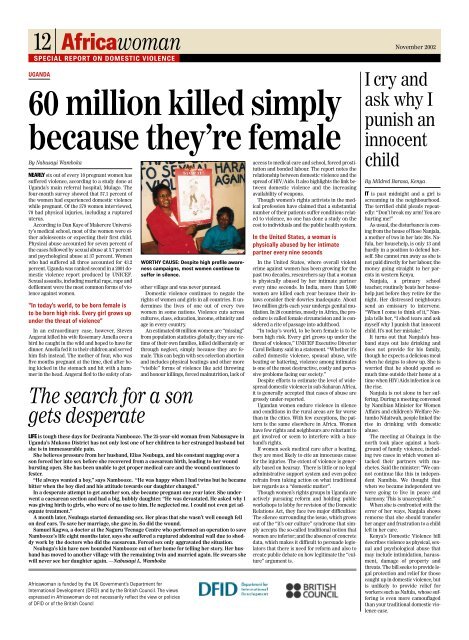Issue 7 - Domestic Violence - ColdType
Issue 7 - Domestic Violence - ColdType
Issue 7 - Domestic Violence - ColdType
Create successful ePaper yourself
Turn your PDF publications into a flip-book with our unique Google optimized e-Paper software.
12 Africawoman November<br />
SPECIAL REPORT ON DOMESTIC VIOLENCE<br />
UGANDA<br />
60 million killed simply<br />
because they’re female<br />
By Nabusayi Wamboka<br />
NEARLY six out of every 10 pregnant women has<br />
suffered violence, according to a study done at<br />
Uganda’s main referral hospital, Mulago. The<br />
four-month survey showed that 57.1 percent of<br />
the women had experienced domestic violence<br />
while pregnant. Of the 379 women interviewed,<br />
70 had physical injuries, including a ruptured<br />
uterus.<br />
According to Dan Kaye of Makerere University’s<br />
medical school, most of the women were either<br />
adolescents or expecting their first child.<br />
Physical abuse accounted for seven percent of<br />
the cases followed by sexual abuse at 5.7 percent<br />
and psychological abuse at 37 percent. Women<br />
who had suffered all three accounted for 43.2<br />
percent. Uganda was ranked second in a 2001 domestic<br />
violence report produced by UNICEF.<br />
Sexual assaults, including marital rape, rape and<br />
defilement were the most common forms of violence<br />
against women.<br />
“In today’s world, to be born female is<br />
to be born high risk. Every girl grows up<br />
under the threat of violence”<br />
In an extraordinary case, however, Steven<br />
Angerai killed his wife Rosemary Amella over a<br />
bird he caught in the wild and hoped to have for<br />
dinner. Amella fed it to their children and served<br />
him fish instead. The mother of four, who was<br />
five months pregnant at the time, died after being<br />
kicked in the stomach and hit with a hammer<br />
in the head. Angerai fled to the safety of an-<br />
Africawoman is funded by the UK Government’s Department for<br />
International Development (DFID) and by the British Council. The views<br />
expressed in Africawoman do not necessarily reflect the view or policies<br />
of DFID or of the British Councl<br />
WORTHY CAUSE: Despite high profile awareness<br />
campaigns, most women continue to<br />
suffer in silence.<br />
other village and was never pursued.<br />
<strong>Domestic</strong> violence continues to negate the<br />
rights of women and girls in all countries. It undermines<br />
the lives of one out of every two<br />
women in some nations. <strong>Violence</strong> cuts across<br />
cultures, class, education, income, ethnicity and<br />
age in every country.<br />
An estimated 60 million women are “missing”<br />
from population statistics globally; they are victims<br />
of their own families, killed deliberately or<br />
through neglect, simply because they are female.<br />
This can begin with sex-selection abortion<br />
and includes physical beatings and other more<br />
“visible” forms of violence like acid throwing<br />
and honour killings, forced malnutrition, lack of<br />
The search for a son<br />
gets desperate<br />
LIFE is tough these days for Deziranta Nambooze. The 25-year-old woman from Nabusugwe in<br />
Uganda’s Mukono District has not only lost one of her children to her estranged husband but<br />
she is in immeasurable pain.<br />
She believes pressure from her husband, Elias Nsubuga, and his constant nagging over a<br />
son forced her into sex before she recovered from a caesarean birth, leading to her wound<br />
bursting open. She has been unable to get proper medical care and the wound continues to<br />
fester.<br />
“He always wanted a boy,” says Nambooze. “He was happy when I had twins but he became<br />
bitter when the boy died and his attitude towards our daughter changed.”<br />
In a desperate attempt to get another son, she became pregnant one year later. She underwent<br />
a caesarean section and had a big, bubbly daughter. “He was devastated. He asked why I<br />
was giving birth to girls, who were of no use to him. He neglected me. I could not even get adequate<br />
treatment.”<br />
A month later, Nsubuga started demanding sex. Her pleas that she wasn’t well enough fell<br />
on deaf ears. To save her marriage, she gave in. So did the wound.<br />
Samuel Kagwa, a doctor at the Naguru Teenage Centre who performed an operation to save<br />
Nambooze’s life eight months later, says she suffered a ruptured abdominal wall due to shoddy<br />
work by the doctors who did the caesarean. Forced sex only aggravated the situation.<br />
Nsubuga’s kin have now hounded Nambooze out of her home for telling her story. Her husband<br />
has moved to another village with the remaining twin and married again. He swears she<br />
will never see her daughter again. —Nabusayi L. Wamboka<br />
access to medical care and school, forced prostitution<br />
and bonded labour. The report notes the<br />
relationship between domestic violence and the<br />
spread of HIV/Aids. It also highlights the link between<br />
domestic violence and the increasing<br />
availability of weapons.<br />
Though women’s rights activists in the medical<br />
profession have claimed that a substantial<br />
number of their patients suffer conditions related<br />
to violence, no one has done a study on the<br />
cost to individuals and the public health system.<br />
In the United States, a woman is<br />
physically abused by her intimate<br />
partner every nine seconds<br />
In the United States, where overall violent<br />
crime against women has been growing for the<br />
past two decades, researchers say that a woman<br />
is physically abused by her intimate partner<br />
every nine seconds. In India, more than 5,000<br />
women are killed each year because their inlaws<br />
consider their dowries inadequate. About<br />
two million girls each year undergo genital mutilation.<br />
In 28 countries, mostly in Africa, the procedure<br />
is called female circumcision and is considered<br />
a rite of passage into adulthood.<br />
“In today’s world, to be born female is to be<br />
born high risk. Every girl grows up under the<br />
threat of violence,” UNICEF Executive Director<br />
Carol Bellamy said in a statement. “Whether it’s<br />
called domestic violence, spousal abuse, wife<br />
beating or battering, violence among intimates<br />
is one of the most destructive, costly and pervasive<br />
problems facing our society.”<br />
Despite efforts to estimate the level of widespread<br />
domestic violence in sub-Saharan Africa,<br />
it is generally accepted that cases of abuse are<br />
grossly under-reported.<br />
Ugandan women endure violence in silence<br />
and conditions in the rural areas are far worse<br />
than in the cities. With few exceptions, the pattern<br />
is the same elsewhere in Africa. Women<br />
have few rights and neighbours are reluctant to<br />
get involved or seem to interfere with a husband’s<br />
rights.<br />
If women seek medical care after a beating,<br />
they are most likely to cite an innocuous cause<br />
for the injuries. The extent of violence is generally<br />
based on hearsay. There is little or no legal<br />
administrative support system and even police<br />
refrain from taking action on what traditional<br />
law regards as a “domestic matter”.<br />
Though women’s rights groups in Uganda are<br />
actively pursuing reform and holding public<br />
workshops to lobby for revision of the <strong>Domestic</strong><br />
Relations Act, they face two major difficulties:<br />
The silence surrounding the issue, which grows<br />
out of the “it’s our culture” syndrome that simply<br />
accepts the so-called traditional notion that<br />
women are inferior; and the absence of concrete<br />
data, which makes it difficult to persuade legislators<br />
that there is need for reform and also to<br />
create public debate on how legitimate the “culture”<br />
argument is.<br />
2002<br />
I cry and<br />
ask why I<br />
punish an<br />
innocent<br />
child<br />
By Mildred Barasa, Kenya<br />
IT is past midnight and a girl is<br />
screaming in the neighbourhood.<br />
The terrified child pleads repeatedly:<br />
“Don’t break my arm! You are<br />
hurting me!”<br />
As usual, the disturbance is coming<br />
from the house of Rose Nanjala,<br />
a mother of two in her late 20s. Nafula,<br />
her househelp, is only 13 and<br />
hardly in a position to defend herself.<br />
She cannot run away as she is<br />
not paid directly for her labour, the<br />
money going straight to her parents<br />
in western Kenya.<br />
Nanjala, a primary school<br />
teacher, routinely beats her househelp<br />
just before they retire for the<br />
night. Her distressed neighbours<br />
send an emissary to intervene.<br />
“When I come to think of it,” Nanjala<br />
tells her, “I shed tears and ask<br />
myself why I punish that innocent<br />
child. It’s not her mistake.”<br />
It turns out that Nanjala’s husband<br />
stays out late drinking and<br />
does not provide for his family,<br />
though he expects a delicious meal<br />
when he deigns to show up. She is<br />
worried that he should spend so<br />
much time outside their home at a<br />
time when HIV/Aids infection is on<br />
the rise.<br />
Nanjala is not alone in her suffering.<br />
During a meeting convened<br />
by Namibian Minister for Women<br />
Affairs and children’s Welfare Netumbo<br />
Ndaitwah, people linked the<br />
rise in drinking with domestic<br />
abuse.<br />
The meeting at Ohaingu in the<br />
north took place against a background<br />
of family violence, including<br />
two cases in which women attacked<br />
their partners with machetes.<br />
Said the minister: “We cannot<br />
continue like this in independent<br />
Namibia. We thought that<br />
when we became independent we<br />
were going to live in peace and<br />
harmony. This is unacceptable.”<br />
When she is confronted with the<br />
error of her ways, Nanjala shows<br />
remorse that she should transfer<br />
her anger and frustration to a child<br />
left in her care.<br />
Kenya’s <strong>Domestic</strong> <strong>Violence</strong> bill<br />
describes violence as physical, sexual<br />
and psychological abuse that<br />
may include intimidation, harassment,<br />
damage of property and<br />
threats. The bill seeks to provide legal<br />
protection and relief for those<br />
caught up in domestic violence, but<br />
is unlikely to provide relief for<br />
workers such as Nafula, whose suffering<br />
is even more camouflaged<br />
than your traditional domestic violence<br />
case.
















